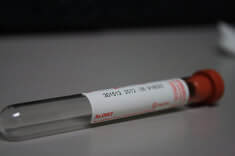Heartworms sure sound scary—and they are! Though we don’t see a ton of heartworm cases in Fairfield, we recently did diagnose a few, so we are trying to protect as many patients as possible. Also, many of our patients travel to other areas where heartworm may be more prevalent. Read on to learn about what heartworms are, where they come from, and what we can do to prevent them in our pets.
What are heartworms?

Simply put, they are a parasitic worm that causes heart disease.
In dogs, the adult worms live in the large arteries in the lungs, where they can cause serious problems with blood flow in the right side of the heart. The worms themselves can also dislodge and clog the smaller arteries in the lungs, causing a type of pulmonary embolism and serious respiratory distress.

In cats, the larva are usually killed by the immune system before they become adult worms, but the larva still cause inflammation that can damage the lungs, resulting in symptoms very similar to asthma (coughing and wheezing).
Where do the heartworms come from?

The answer is the ubiquitous mosquito—and any dog that is exposed to mosquitoes could be at risk. Microscopic heartworm larva infect the patient when a mosquito bites. The larva matures in the pet’s body and makes their way to the lungs.
How do we know if a pet is infected?

For dogs, the American Heartworm Society recommends an annual blood test. Even if your pet is on monthly heartworm prevention, the test will likely still be recommended because it’s the only way to make sure the medication is working. The test we use only takes 3 drops of blood, and can be run in the clinic in about 10 minutes. This test tells us if a dog has adult, female heartworms.
For cats, testing is available, but it is a little bit different in that it tells us if a cat has ever been exposed to heartworms, not just if they currently have any.
What do we do about it?
If a pet does have heartworm, treatment is recommended to kill the worms so that they don’t continue to damage the heart and lungs. Unfortunately, treatment is not simple—it requires multiple painful injections, over a couple of months, strict exercise restriction for several weeks, and is costly. Prevention, when possible, is a much better strategy! Heartworm prevention is available as oral or topical products, and is given or applied each month. We carry Heartgard, a beef-flavored chewable tablet, for dogs, and Revolution, a topical product, for cats.
Let our staff know if you have any questions about heartworm transmission, testing, or prevention!
